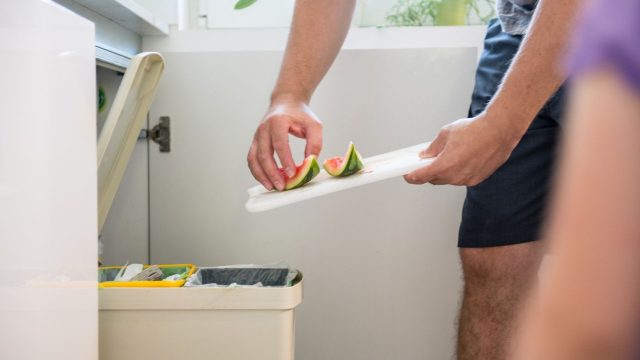14
Feb
Fighting the Climate Crisis with Compost, One Meal at a Time

(Beyond Pesticides, February 14, 2022) When your food scraps are sent to the landfill, their anaerobic decomposition releases methane, a greenhouse gas with 84 times the global warming potential of carbon dioxide over its first 20 years in the atmosphere. By composting those scraps instead, you not only reduce methane emissions, but also support organic practices that eliminate other greenhouse gases, like nitrogen fertilizer.
California’s SB 1383, signed into law in 2016, now requires individuals and businesses to separate food waste from trash. While individuals and businesses can compost their own food waste, local agencies also facilitate the process by providing separate bins for organic materials, including food waste, lawn and garden trimmings, and paper. The law also provides a means for collecting and distributing surplus edible food.
Methane comprises 16% of greenhouse gas (GHG) emissions, but due to its greater warming potential, it affects climate change at least as much as carbon dioxide (CO2). Agriculture, energy production, and landfills are among the greatest sources of methane emissions. Directing food waste from landfills to compost can reduce two of these sources. In addition, the use of synthetic fertilizers is a particular and noxious contributor to the rising planetary temperature, largely through these products’ emissions of nitrous oxide, or NOx — another potent greenhouse gas that also pollutes the air and feeds the development of ozone. NOx is roughly 300 times as potent in trapping heat as CO2. Nitrous oxide levels have increased, compared to pre-industrial levels, by 20% from all sources.
Directing food waste to compost can support organic gardening, farming, and land management, thus reducing dependence on synthetic nitrogen fertilizer. As states follow the lead of California in mandating separation of compostable waste, they should also mandate the use of organic land management by public agencies on parks, playing fields, and other public lands.
You don’t need to wait for a law. Start composting now.
Letter to Governor and state legislators outside of California:
When our food scraps are sent to the landfill, their anaerobic decomposition releases methane, a greenhouse gas with 84 times the global warming potential of carbon dioxide over its first 20 years in the atmosphere. By composting those scraps instead, we not only reduce methane emissions, but also support organic practices that eliminate other greenhouse gases, like nitrogen fertilizer.
California’s SB 1383, signed into law in 2016, now requires individuals and businesses to separate food waste from trash. While individuals and businesses can compost their own food waste, local agencies also facilitate the process by providing separate bins for organic materials, including food waste, lawn and garden trimmings, and paper. The law also provides a means for collecting and distributing surplus edible food.
Methane comprises 16% of greenhouse gas (GHG) emissions, but due to its greater warming potential, it affects climate change at least as much as carbon dioxide (CO2). Agriculture, energy production, and landfills are among the greatest sources of methane emissions. Directing food waste from landfills to compost can reduce two of these sources. In addition, the use of synthetic fertilizers is a particular and noxious contributor to the rising planetary temperature, largely through these products’ emissions of nitrous oxide, or NOx — another potent greenhouse gas that also pollutes the air and feeds the development of ozone. NOx is roughly 300 times as potent in trapping heat as CO2. Nitrous oxide levels have increased, compared to pre-industrial levels, by 20% from all sources.
Directing food waste to compost can support organic gardening, farming, and land management, thus reducing dependence on synthetic nitrogen fertilizer. Please draft and pass legislation following the lead of California in mandating separation of compostable waste and also mandate the use of organic land management by public agencies on parks, playing fields, and other public lands.
Please increase the impact of this legislation by using your leadership to require the management of our state parks with organic land management practices. Organic practices not only counter climate change, but they also protect us from the hazards of pesticides.
Thank you.
Letter to Governor and state legislators of California:
I wish to thank you for passing and implementing the 2016 SB 1383, which now requires individuals and businesses to separate food waste from trash.
When our food scraps are sent to the landfill, their anaerobic decomposition releases methane, a greenhouse gas with 84 times the global warming potential of carbon dioxide over its first 20 years in the atmosphere. By composting those scraps instead, we not only reduce methane emissions, but also support organic practices that eliminate other greenhouse gases, like nitrogen fertilizer.
Please increase the impact of SB 1383 by using your leadership to require the management of our state parks with organic land management practices. Organic practices not only counter climate change, but they also protect us from the hazards of pesticides.
Thank you.











anything we can do that helps the health of our planet will trickle down to all of us. Thanks for helping us preserve future life.
April 20th, 2022 at 8:11 pm